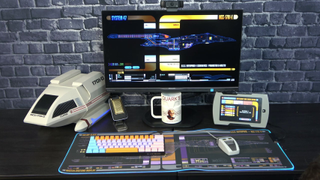To counter the recent Borg incursion into PC building, YouTuber TimeTravelingTech (aka James) has designed and built his own Starfleet themed rig. We're not sure how well matched one shuttle is against a Borg cube though. That said, the build is beautiful. So lets take it for a test flight.
James is no stranger, having created a series of 3D printable cases for the Raspberry Pi. These include a rather useful print-in-place, folding Raspberry Pi case. Also, a Raspberry Pi case modelled on the Ghostbusters fire station. For James' latest project, timed to coincide with the release of Star Trek: Picard Season 3 we see him build a shuttle PC. Not the Shuttle brand, a Star Trek shuttle.
The case itself is modelled on a Type 6 shuttlecraft, commonly used from season 5 of Star Trek: The Next Generation (Season 5, episode 2 "Darmok" and also reused in Star Trek V: The Final Frontier). But this isn't an off-the-shelf case, James spent considerable time designing the case in AutoDesk Fusion 360, then printing the many pieces on one of the best 3D printers, a Prusa MK3S+. Looking at a screengrab from the video, we can see that James favored PETG over PLA, we just hope that he used the Best 3D filament. The choice is simple. PETG is a much stronger material than PLA and it will last for a long time. That said, PETG is harder to print, requiring the hot end to be at around 240 degrees Celsius, and the bed at approximately 90°C.
Enough geeking out at Star Trek and 3D printing. Inside the shuttle is a PC with a spec from 2014. At the heart is an i5 4460, 16GB of DDR3, 512GB SSD and an Nvidia GT650 GPU. As James says in the video, this is just a test. If it all goes well a much higher spec machine will take its place. The PC is housed on a 3D printed tray, enabling the entire unit to be slid in and out of the case. If you need access to USB ports, there are some hidden in the warp engines (in the Bussard Collector's at the front of the nacelle). Keeping the PC cool is a plethora of Noctua fans. We spotted an NF-A8 (80mm PWM fan) and two NF-A4x10 (40 x 10mm FLX fan). Airflow for the fans is via cleverly 3D printed cockpit windows and intakes on the side of the shuttle, they look perfectly "in-universe". Just behind the cockpit are two grey greebles which hide the power and reset buttons.
The nacelles house a strip of high density ("there are FOUR LIGHTS" per inch) NeoPixels, which are controlled via an Wemos D1 Mini (an ESP8266 based board) and via some clever software, James is able to control the LEDs via an old Windows tablet. We've used the Wemos D1 Mini and NeoPixels with WLED to create light shows during the holiday season.
James then completes the build with an LCARS themed keyboard, a 1990s phaser mouse, Galaxy class Master Systems Display and a System 47 screensaver.
The build process and final product are superb and a credit to James' Star Trek fandom and maker ethic.

